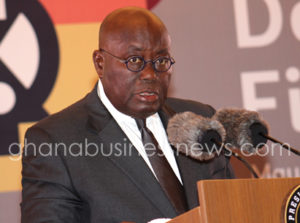Governments must end repression of free speech – Akufo-Addo

President Nana Addo Dankwa Akufo-Addo has called governments the world over, to put an end to state sponsored acts that impede the practice of journalism.
Rather, they (governments) should promote free, diverse and pluralist media practice, as a free and unimpeded press had the potential to improve national discourse, foster transparency and accountability, quicken the development of societies, and deepen democratic processes.
Speaking at the World Press Freedom Day Awards Night celebration in Accra on Wednesday, President Akufo-Addo noted that though there were challenges with press freedom, a truly independent media was essential to protect and enable human rights and fundamental freedoms.
The media has been proven to be a catalyst of advancement of society, he said.
Ghana is hosting this year’s global celebration of the World Press Freedom Day, with over 500 journalists from across the world taking part in the event in Accra, which is marked every May 3. This year’s celebration was under the theme: Keeping Power in Check: Media, Justice and The Rule of Law.
The Awards night honoured 31 year-old Egyptian photojournalist Mahmoud Abu Zeid, known as Shawkan, as the laureate of the 2018 UNESCO/Guillermo Cano Press Freedom Prize.
Shawkan has been in jail since 14 August 2013 when he was arrested while covering a demonstration at Rabaa Al-Adawiya Square in Cairo. The award, which comes with a prize of $25,000, funded by the Guillermo Cano Isaza Foundation, paid tribute to his courage, resistance and commitment to freedom of expression.
Whilst advocating a media free of government control, President Akufo-Addo pressed the media to establish a responsible culture and to fulfil their obligations to build a knowledgeable society for the advancement of democracy and the people.
He said the media ought to demonstrate a high sense of responsibility in their reportage, and called on practitioners the world over to take a second look at the power they wielded and the obligation they owed society, to ensure that integrity was not sacrificed for headlines or breaking news.
The President expressed worry at the increasing practice of misinformation by media practitioners in the quest to be first in breaking the news and punchy headlines, and the deliberate misinformation campaigns and twisting of facts in the news world, which he said was a major threat to the integrity of the news world.
This is a phenomenon the whole world media must resolutely confront and identify and eliminate, if not it would undermine and weaken the media industry, with its rippling catastrophic effect on society, he counselled, urging media owners to invest continuously to build the capacity of their staff for the media ought be on top of its game at all times.
President Akufo-Addo told the gathering that the Ghanaian people would continue to defend the right to free expression to the very end, because of their determination to build a free, open society with accountable governance.
He said: they have manifested, in the Fourth Republic, their deep attachment to the principles of democratic accountability, respect for individual liberties and human rights, and the rule of law.
With the Constitution of the Fourth Republic guaranteeing freedom of expression, including freedom of the press and other media, as a fundamental human right, and making elaborate provisions to protect the freedom and independence of the media, President Akufo-Addo stated that the existing laws, which were continued in force by the same Constitution, contained colonial laws on the country’s statute books that were manifestly anti-libertarian, and repressive of free expression.
“That is why, as Attorney General, under the government of the great Ghanaian statesman, John Agyekum Kufuor, the second President of the Fourth Republic, I led the process, in Parliament, for the repeal of the Criminal Libel Law. The repeal, when it occurred, on 27th July, 2001, was a very happy day for me, representing one of the high points of my public career,” the President said.
The repeal has had a very positive impact on the development of the Ghanaian media, freeing it from unnecessary self-censorship, and promoting a robust and critical media culture, he added.
President Akufo-Addo indicated that the repeal of the law had contributed to the growth of a vibrant media that had won Ghana the reputation of having one of the most media friendly and liberal climates on the continent.
It has also contributed significantly to the deepening of democracy in our country, enhancing public accountability as a strategic goal of public policy, he added.
“The parlous justification, proffered for the retention of the Criminal Libel Law, has been that its repeal has made Ghanaian media practitioners reckless and unprofessional in their work, thereby, at times, damaging the good name and image of public figures, and endangering society as a whole”.
However, President Akufo-Addo indicated that as one of the public figures most constantly vilified in sections of the Ghanaian media, and one who, ironically, was a principal actor in the repeal of the law, he continues to insist that its repeal was necessary in the public interest in the country’s emerging democracy.
“I will say, again, that I much prefer the noisy, boisterous, sometimes scurrilous media of today, to the monotonous, praise-singing, sycophantic one of yesteryear. The Ghanaian media has, in fact, enriched the nation’s governance by its curiosity, investigative skills, and persistence,” he added.
Source: GNA
